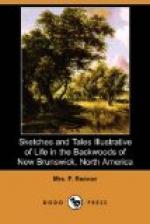is nothing rich or costly, yet there is such an air
of neatness diffused over it, and effect brought out,
that they always recalled to me the painted cottage
scenes of a theatre. But here is a house at which
I have a call to make, and which will illustrate the
“menage” of a New Brunswicker.
Remember, this is not one of the old settlers, who
have overcome all the toil and inconvenience of clearing
and building, and are now enjoying the comforts they
have earned, but it is the log-house of a new farm,
around which the stumps yet stand thick and strong,
and where the ringing of the axe is yet heard incessantly.
In this working country people are, in general, like
the famous Mrs. Gilpin, who, though on pleasure bent,
had yet a frugal mind, and contrive to make business
and amusement go together; and although I had left
home with the intention of paying a visit, a little
business induces me to pause here, ere I proceed to
where I intended; and even here, while arranging this,
I shall enjoy myself as much as though I were sackless
of thought or interest in anything save amusement.
The manufacture of the wool raised on the farm is
the most important part of the women’s work,
and in this the natives particularly excel. As
yet I knew not the mysteries of colouring brown with
butternut bark, nor the proper proportion of sweet
fern and indigo to produce green, so that our wool,
on its return from the carding mill, had been left
with this person—lady, “par courtesie,”—who
was a perfect adept in the art, to be spun and wove:
and the business on which I now call is to arrange
with her as to its different proportions and purposes.
What for blankets, for clothing, or for socks and
mittens, which all require a different style of manufacture,
and are all items of such importance during the winter
snows. Melancthon Grey, whose most Christian and
protestant appellation was abbreviated into “Lank,”
was a true-blooded blue nose. His father had
a noble farm of rich intervale on the banks of the
river Saint John, and was well to do in the world.
Lank was his eldest son, yet no heritage was his,
save his axe and the arm which swung it. The law
of primogeniture exists not in this country, and the
youngest son is frequently heir to that land on which
the older ones have borne the “heat and burthen
of the day,” and rendered valuable by their toil,
until each chooses his own portion in the world, by
taking unto himself a wife and a lot of forest land,
and thus another hard-won homestead is raised,
and sons enough to choose among for heirs. Melancthon
Grey had wedded his cousin, a custom common among
the “blue noses,” and which most likely
had its origin in the patriarchal days of the earlier
settlers, when the inhabitants were few. Sybel
was a sweet pretty girl, deficient, as the Americans
all are, in those high-toned feelings which characterise
the depth of woman’s love in the countries of
Europe, yet made, as they generally do, an affectionate




